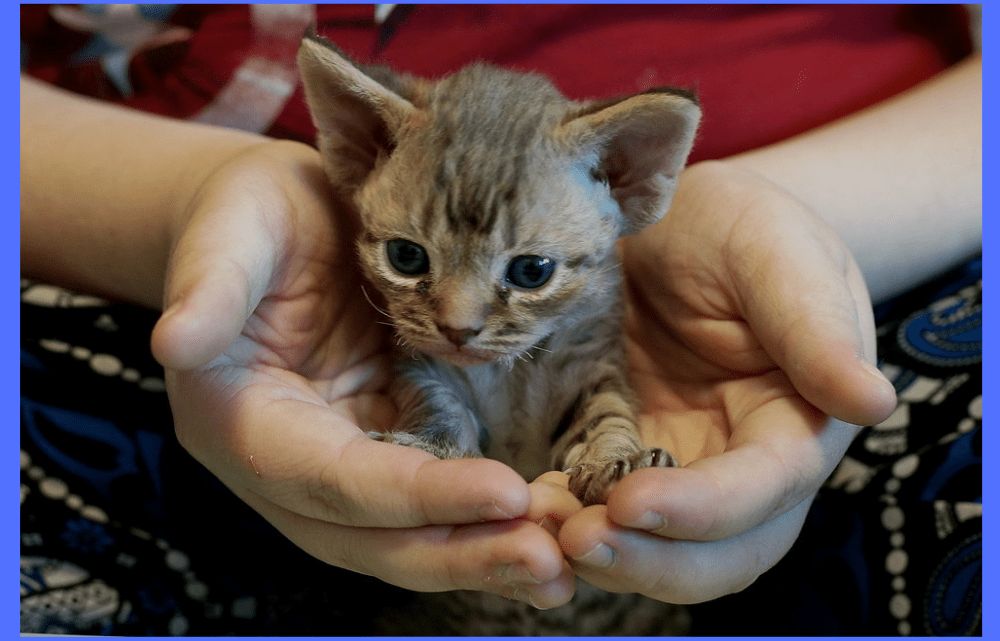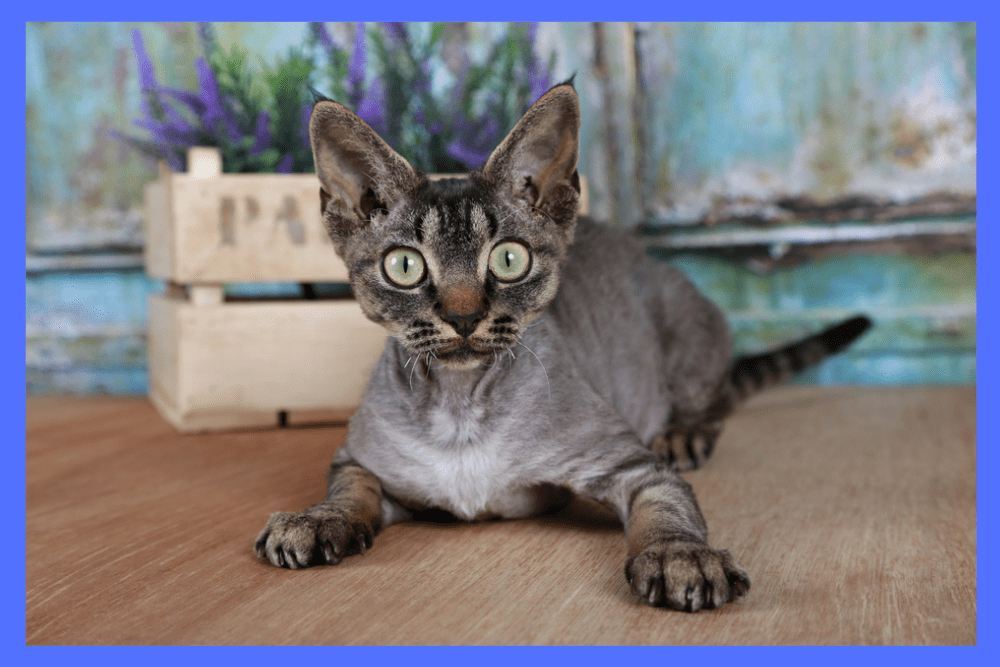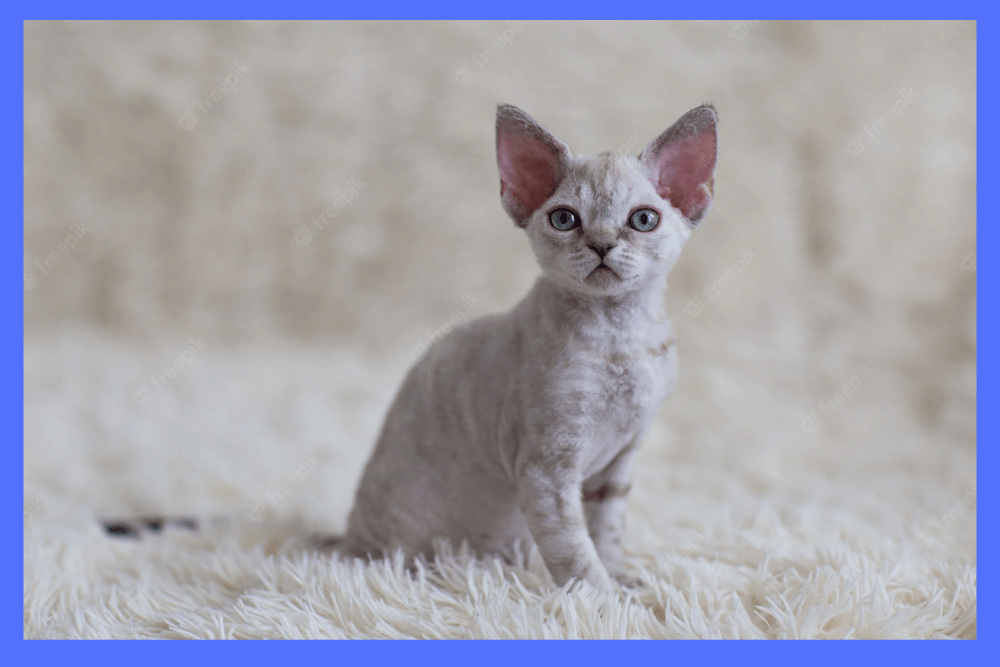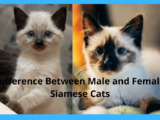
What Does a Devon Rex Cat Look Like? Key Features Explained
What is the Devon Rex cat breed?
The Devon Rex is a unique and playful cat breed known for its distinctive curly coat and large, bat-like ears. Originating in Devon, England, it was first discovered in the early 1960s when a naturally occurring mutation gave rise to the breed’s signature look. Today, the Devon Rex is a beloved companion, known for its friendly and curious nature.
These cats have a mischievous reputation, making them a favorite among families. Their affectionate demeanor and intelligence make them easy to train. Despite being relatively new in the cat world, the Devon Rex has quickly become popular among cat lovers.
Physical Appearance:
What are the key physical features of a Devon Rex cat?
The Devon Rex is small to medium-sized with a slender body and muscular build. Its large ears and curly fur make it one of the most distinctive cats around.
This breed’s light frame and wide-set eyes add to its elegance. The unique combination of these traits gives it a graceful, almost elf-like look.
What does the coat of a Devon Rex cat look like?
The curly coat is soft and velvety, unlike most cats. Its texture feels almost like silk. Not as fine as the Cornish Rex, the curls are thicker and have more volume.
This breed’s coat is short, but its distinctive waves make it stand out. It’s perfect for those who prefer a low-shedding cat.
Why do Devon Rex cats have curly fur?
The curly fur comes from a genetic mutation that affects the hair follicles. This mutation, first observed in the 1960s, is passed down to offspring.
It’s a fun quirk of genetics that gives them a unique and playful look. Their fur is also a reminder of the breed’s natural evolution.
What colors can Devon Rex cats be?
Devon Rex cats come in a variety of colors and patterns. From solid shades like black and white to pointed patterns resembling the Siamese.
You can also find them in tabby or tortoiseshell patterns. The possibilities are vast, making each one visually unique.
What makes the Devon Rex cat’s face distinctive?
Their triangular face is sharp with high cheekbones. Add in their big, almond-shaped eyes, and they have an almost elvish charm.
The face shape gives them a curious, expressive look that makes you feel like they’re always up to something fun.

Distinctive Features:
What is special about the ears of a Devon Rex cat?
The Devon Rex has large, wide-set ears that are hard to miss. These ears give the breed a bat-like look, adding to their quirky charm. They’re not just for show—they also help with hearing, as their wide placement allows them to pick up on even the faintest sounds.
This feature is one of the most distinguishing aspects of the breed, making them easily recognizable among other cats.
What does the tail of a Devon Rex cat look like?
The Devon Rex’s slender, tapered tail is another standout feature. It’s long and graceful, often carried elegantly, adding to the breed’s overall sleek appearance. It’s not just about looks; this tail helps the cat maintain balance, making them even more agile.
Their tail, like the rest of their body, exudes elegance and poise—a true reflection of their playful yet graceful nature.
Do Devon Rex cats have distinctive eyes?
Yes! The Devon Rex is known for its large, almond-shaped eyes that stand out on its triangular face. These eyes make them look constantly curious and often add to their mischievous expression. They come in a variety of colors, from bright gold to green, further adding to the breed’s striking appearance.
Their expressive eyes make them not only cute but also give them a personality-packed look, as if they’re always planning their next playful move.
Devon Rex vs. Cornish Rex vs. Sphynx: A Visual Comparison
| Feature | Devon Rex | Cornish Rex | Sphynx |
|---|---|---|---|
| Coat | Short, soft, wavy curls | Fine, tight curls | Hairless with minimal peach fuzz |
| Ears | Large, low-set, rounded tips | Large, wide at base, rounded tips | Very large, triangular, bat-like |
| Face Shape | Triangular with high cheekbones | Long, narrow, wedge-shaped | Wedge-shaped with prominent cheekbones |
| Eyes | Large, oval, set wide apart | Medium, oval, set wide apart | Large, almond-shaped |
| Body Type | Slender, muscular, compact | Slender, long, graceful | Muscular, medium-sized, barrel-chested |
Key Visual Differences:
- Coat Texture: The Devon Rex has a short, soft, and wavy coat, while the Cornish Rex features fine, tight curls. The Sphynx is hairless with minimal peach fuzz, giving it a distinct appearance.
- Ear Shape: The Devon Rex‘s ears are large and low-set with rounded tips, differing from the Cornish Rex‘s large, wide-set ears with rounded tips. The Sphynx stands out with its very large, triangular, bat-like ears.
- Facial Structure: The Devon Rex has a triangular face with high cheekbones, whereas the Cornish Rex presents a long, narrow, wedge-shaped face. The Sphynx displays a wedge-shaped face with prominent cheekbones.
- Eye Shape: The Devon Rex‘s eyes are large and oval, set wide apart, contrasting with the Cornish Rex‘s medium, oval eyes. The Sphynx features large, almond-shaped eyes.
- Body Type: The Devon Rex is slender, muscular, and compact, while the Cornish Rex is slender, long, and graceful. The Sphynx is muscular, medium-sized, and barrel-chested.

Health & Grooming Considerations for the Devon Rex
Does the Devon Rex cat’s coat affect grooming needs?
Yes, the Devon Rex has a delicate, curly coat that requires specific care. Over-brushing can damage their fragile hair, so it’s best to use a soft-bristle brush or a grooming glove weekly to remove loose hairs. Bathing every 4–6 weeks with a mild, cat-safe shampoo helps manage oil buildup and keeps their skin healthy. Some owners prefer to clean their cats using unscented baby wipes to remove grease without the need for a full bath.
Regular ear cleaning is essential due to the breed’s large ears, which can accumulate wax and debris. Use a vet-approved ear cleaner and a soft cloth to gently wipe the outer ear canal. Additionally, dental care is important; brushing their teeth with a cat-specific toothbrush and toothpaste can help prevent dental issues.
Are there any health concerns related to the appearance of a Devon Rex cat?
Yes, the Devon Rex is prone to several health conditions:
- Hypertrophic Cardiomyopathy (HCM): A hereditary heart disease causing thickening of the heart muscles, leading to reduced heart function. Regular veterinary check-ups and screenings, including echocardiograms, are crucial for early detection and management.
- Hereditary Myopathy: A neurological condition that affects muscle function, leading to weakness and spasticity. It typically manifests between 3 to 23 weeks of age.
- Patellar Luxation: A musculoskeletal issue where the kneecap dislocates from its normal position, causing lameness and difficulty walking. Treatment may involve surgery, depending on severity.
- Hip Dysplasia: A genetic condition causing malformation of the hip joints, leading to arthritis and mobility issues. Early diagnosis through X-rays can help manage the condition.
- Urticaria Pigmentosa: A skin disorder causing crusty sores on the body, which can be treated with steroids and omega-3 fatty acids.
To maintain overall health, it’s important to provide a balanced diet, regular exercise, and a stress-free environment. Regular veterinary visits are essential for early detection and management of these conditions.
Why Are Devon Rex Cats So Popular?
The Devon Rex has charmed its way into the hearts of cat enthusiasts worldwide. With their distinctive appearance and engaging personalities, it’s no wonder they’re a favorite among many.
Playful & Intelligent
Often likened to “monkeys in a cat suit,” Devon Rex cats are known for their high energy and intelligence. They enjoy interactive play and can even learn tricks like fetch. Their curiosity and problem-solving abilities make them endlessly entertaining companions.
Affectionate Companions
Devon Rex cats are people-oriented and thrive on human interaction. They often follow their owners from room to room and enjoy cuddling sessions. This breed’s affectionate nature makes them ideal for families or individuals seeking a loyal feline friend.
Unique Appearance
Their large ears, big eyes, and wavy coat give them an almost pixie-like appearance. This distinctive look sets them apart from other breeds and adds to their charm.
Low Shedding
While no cat is entirely hypoallergenic, the Devon Rex’s short, curly coat sheds minimally, making them a better option for allergy sufferers. Regular grooming can further reduce shedding and keep their coat healthy.
Adaptable & Social
Devon Rex cats are adaptable to various living situations, including apartments. Their social nature means they get along well with other pets and children, provided they are properly introduced.
📚 Sources
- The Cat Fanciers’ Association (CFA) – Devon Rex breed profile and recognition
👉 https://cfa.org/devon-rex - The International Cat Association (TICA) – Devon Rex breed standards
👉 https://tica.org/breeds/devon-rex - Devon Rex Rescue – Rescue and adoption information for Devon Rex cats
👉 https://devonrexrescue.com - PetMD – Grooming and care tips for Devon Rex cats
👉 https://www.petmd.com/cat/breeds/c_ct_devon_rex - Catster – Health issues and genetic concerns in Devon Rex cats
👉 https://www.catster.com/cat-breeds/devon-rex - VCA Hospitals – Health and grooming tips for Devon Rex cats
👉 https://vcahospitals.com/know-your-pet/devon-rex-cat - The Spruce Pets – Understanding the Devon Rex’s personality and appearance
👉 https://www.thesprucepets.com/devon-rex-cat-breed-profile-4693660


